8 items found
Page 1 of 1
-
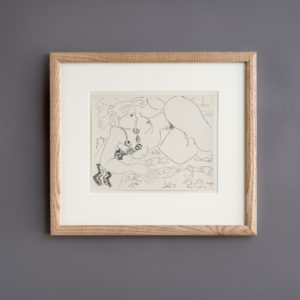
Cahiers D’Art, Dessins de Matisse
£300 eachCahiers D’Art, Dessins de Matisse
Cahiers d'Art is a French artistic and literary journal originally founded in 1926 by Christian Zervos, a Greek philosopher, editor. Born in 1889 in Argostoli on the Greek island of Cephalonia he was brought up in Alexandria, Egypt, finally moving to Paris in 1922. In 1924 Zervos joined the publishing firm Editions Morancé writing art articles for the magazine L'Art d'aujourd '. As an editor, he met many of the artists about whom the magazine wrote: Henri Matisse, Georges Braque, Ferdinand Léger, and Pablo Picasso. He left Morancé in 1926 to found his own journal Cahiers d'art becoming simultaneously publisher, director, model maker, chief editor and main editor. Each issue balanced primitive arts with the modern and contemporary arts and articles by art critics with more literary and poetic texts. According to Zervos, the interest in prehistoric, ancient and extra-European arts was necessary to get a glimpse of contemporary art. It was Zervos who took on the enormous task of documenting all the works of Pablo Picasso into a33-volume catalogue raisonnée, published between 1932 and 1978. One of his deepest wishes was to build up with Cahiers d’Art the visual archives of the artists he considered important. Zervos married Yvonne Marion who ran an art gallery, Galerie du Dragon, next to the location of her husband's shop, the rue Dragon on the left bank of Paris. Madame Zervos became an integral part of her husband's accomplishment and assembling their art collection. Initially published from 1926 to 1960 Cahiers d'Art still exists today after Swedish collector Staffan Ahrenberg purchased the publication and relaunched it in October 2012.£300 each -
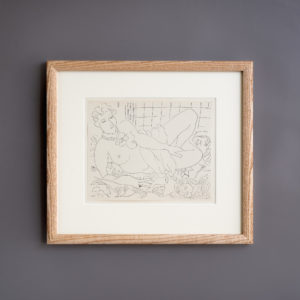
Cahiers D’Art, Dessins de Matisse
£300 eachCahiers D’Art, Dessins de Matisse
Cahiers d'Art is a French artistic and literary journal originally founded in 1926 by Christian Zervos, a Greek philosopher, editor. Born in 1889 in Argostoli on the Greek island of Cephalonia he was brought up in Alexandria, Egypt, finally moving to Paris in 1922. In 1924 Zervos joined the publishing firm Editions Morancé writing art articles for the magazine L'Art d'aujourd '. As an editor, he met many of the artists about whom the magazine wrote: Henri Matisse, Georges Braque, Ferdinand Léger, and Pablo Picasso. He left Morancé in 1926 to found his own journal Cahiers d'art becoming simultaneously publisher, director, model maker, chief editor and main editor. Each issue balanced primitive arts with the modern and contemporary arts and articles by art critics with more literary and poetic texts. According to Zervos, the interest in prehistoric, ancient and extra-European arts was necessary to get a glimpse of contemporary art. It was Zervos who took on the enormous task of documenting all the works of Pablo Picasso into a33-volume catalogue raisonnée, published between 1932 and 1978. One of his deepest wishes was to build up with Cahiers d’Art the visual archives of the artists he considered important. Zervos married Yvonne Marion who ran an art gallery, Galerie du Dragon, next to the location of her husband's shop, the rue Dragon on the left bank of Paris. Madame Zervos became an integral part of her husband's accomplishment and assembling their art collection. Initially published from 1926 to 1960 Cahiers d'Art still exists today after Swedish collector Staffan Ahrenberg purchased the publication and relaunched it in October 2012.£300 each -
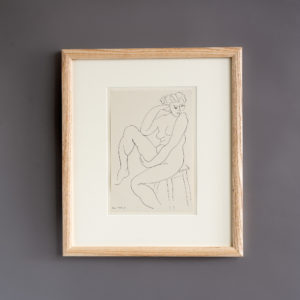
Cahiers D’Art, Dessins de Matisse
£300 eachCahiers D’Art, Dessins de Matisse
Cahiers d'Art is a French artistic and literary journal originally founded in 1926 by Christian Zervos, a Greek philosopher, editor. Born in 1889 in Argostoli on the Greek island of Cephalonia he was brought up in Alexandria, Egypt, finally moving to Paris in 1922. In 1924 Zervos joined the publishing firm Editions Morancé writing art articles for the magazine L'Art d'aujourd '. As an editor, he met many of the artists about whom the magazine wrote: Henri Matisse, Georges Braque, Ferdinand Léger, and Pablo Picasso. He left Morancé in 1926 to found his own journal Cahiers d'art becoming simultaneously publisher, director, model maker, chief editor and main editor. Each issue balanced primitive arts with the modern and contemporary arts and articles by art critics with more literary and poetic texts. According to Zervos, the interest in prehistoric, ancient and extra-European arts was necessary to get a glimpse of contemporary art. It was Zervos who took on the enormous task of documenting all the works of Pablo Picasso into a33-volume catalogue raisonnée, published between 1932 and 1978. One of his deepest wishes was to build up with Cahiers d’Art the visual archives of the artists he considered important. Zervos married Yvonne Marion who ran an art gallery, Galerie du Dragon, next to the location of her husband's shop, the rue Dragon on the left bank of Paris. Madame Zervos became an integral part of her husband's accomplishment and assembling their art collection. Initially published from 1926 to 1960 Cahiers d'Art still exists today after Swedish collector Staffan Ahrenberg purchased the publication and relaunched it in October 2012.£300 each -
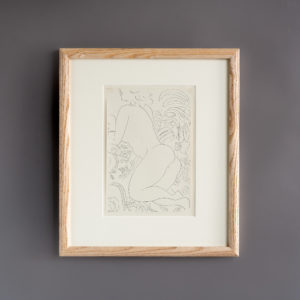
Cahiers D’Art, Dessins de Matisse
£300 eachCahiers D’Art, Dessins de Matisse
Cahiers d'Art is a French artistic and literary journal originally founded in 1926 by Christian Zervos, a Greek philosopher, editor. Born in 1889 in Argostoli on the Greek island of Cephalonia he was brought up in Alexandria, Egypt, finally moving to Paris in 1922. In 1924 Zervos joined the publishing firm Editions Morancé writing art articles for the magazine L'Art d'aujourd '. As an editor, he met many of the artists about whom the magazine wrote: Henri Matisse, Georges Braque, Ferdinand Léger, and Pablo Picasso. He left Morancé in 1926 to found his own journal Cahiers d'art becoming simultaneously publisher, director, model maker, chief editor and main editor. Each issue balanced primitive arts with the modern and contemporary arts and articles by art critics with more literary and poetic texts. According to Zervos, the interest in prehistoric, ancient and extra-European arts was necessary to get a glimpse of contemporary art. It was Zervos who took on the enormous task of documenting all the works of Pablo Picasso into a33-volume catalogue raisonnée, published between 1932 and 1978. One of his deepest wishes was to build up with Cahiers d’Art the visual archives of the artists he considered important. Zervos married Yvonne Marion who ran an art gallery, Galerie du Dragon, next to the location of her husband's shop, the rue Dragon on the left bank of Paris. Madame Zervos became an integral part of her husband's accomplishment and assembling their art collection. Initially published from 1926 to 1960 Cahiers d'Art still exists today after Swedish collector Staffan Ahrenberg purchased the publication and relaunched it in October 2012.£300 each -
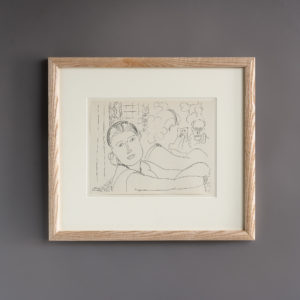
Cahiers D’Art, Dessins de Matisse
£300 eachCahiers D’Art, Dessins de Matisse
Cahiers d'Art is a French artistic and literary journal originally founded in 1926 by Christian Zervos, a Greek philosopher, editor. Born in 1889 in Argostoli on the Greek island of Cephalonia he was brought up in Alexandria, Egypt, finally moving to Paris in 1922. In 1924 Zervos joined the publishing firm Editions Morancé writing art articles for the magazine L'Art d'aujourd '. As an editor, he met many of the artists about whom the magazine wrote: Henri Matisse, Georges Braque, Ferdinand Léger, and Pablo Picasso. He left Morancé in 1926 to found his own journal Cahiers d'art becoming simultaneously publisher, director, model maker, chief editor and main editor. Each issue balanced primitive arts with the modern and contemporary arts and articles by art critics with more literary and poetic texts. According to Zervos, the interest in prehistoric, ancient and extra-European arts was necessary to get a glimpse of contemporary art. It was Zervos who took on the enormous task of documenting all the works of Pablo Picasso into a33-volume catalogue raisonnée, published between 1932 and 1978. One of his deepest wishes was to build up with Cahiers d’Art the visual archives of the artists he considered important. Zervos married Yvonne Marion who ran an art gallery, Galerie du Dragon, next to the location of her husband's shop, the rue Dragon on the left bank of Paris. Madame Zervos became an integral part of her husband's accomplishment and assembling their art collection. Initially published from 1926 to 1960 Cahiers d'Art still exists today after Swedish collector Staffan Ahrenberg purchased the publication and relaunched it in October 2012.£300 each -
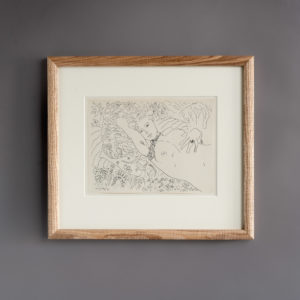
Cahiers D’Art, Dessins de Matisse
£300 eachCahiers D’Art, Dessins de Matisse
Cahiers d'Art is a French artistic and literary journal originally founded in 1926 by Christian Zervos, a Greek philosopher, editor. Born in 1889 in Argostoli on the Greek island of Cephalonia he was brought up in Alexandria, Egypt, finally moving to Paris in 1922. In 1924 Zervos joined the publishing firm Editions Morancé writing art articles for the magazine L'Art d'aujourd '. As an editor, he met many of the artists about whom the magazine wrote: Henri Matisse, Georges Braque, Ferdinand Léger, and Pablo Picasso. He left Morancé in 1926 to found his own journal Cahiers d'art becoming simultaneously publisher, director, model maker, chief editor and main editor. Each issue balanced primitive arts with the modern and contemporary arts and articles by art critics with more literary and poetic texts. According to Zervos, the interest in prehistoric, ancient and extra-European arts was necessary to get a glimpse of contemporary art. It was Zervos who took on the enormous task of documenting all the works of Pablo Picasso into a33-volume catalogue raisonnée, published between 1932 and 1978. One of his deepest wishes was to build up with Cahiers d’Art the visual archives of the artists he considered important. Zervos married Yvonne Marion who ran an art gallery, Galerie du Dragon, next to the location of her husband's shop, the rue Dragon on the left bank of Paris. Madame Zervos became an integral part of her husband's accomplishment and assembling their art collection. Initially published from 1926 to 1960 Cahiers d'Art still exists today after Swedish collector Staffan Ahrenberg purchased the publication and relaunched it in October 2012.£300 each -
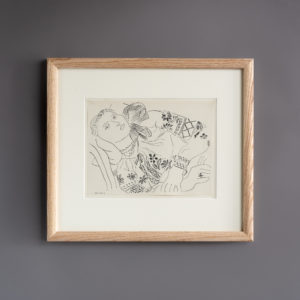
Cahiers D’Art, Dessins de Matisse
£300 eachCahiers D’Art, Dessins de Matisse
Cahiers d'Art is a French artistic and literary journal originally founded in 1926 by Christian Zervos, a Greek philosopher, editor. Born in 1889 in Argostoli on the Greek island of Cephalonia he was brought up in Alexandria, Egypt, finally moving to Paris in 1922. In 1924 Zervos joined the publishing firm Editions Morancé writing art articles for the magazine L'Art d'aujourd '. As an editor, he met many of the artists about whom the magazine wrote: Henri Matisse, Georges Braque, Ferdinand Léger, and Pablo Picasso. He left Morancé in 1926 to found his own journal Cahiers d'art becoming simultaneously publisher, director, model maker, chief editor and main editor. Each issue balanced primitive arts with the modern and contemporary arts and articles by art critics with more literary and poetic texts. According to Zervos, the interest in prehistoric, ancient and extra-European arts was necessary to get a glimpse of contemporary art. It was Zervos who took on the enormous task of documenting all the works of Pablo Picasso into a33-volume catalogue raisonnée, published between 1932 and 1978. One of his deepest wishes was to build up with Cahiers d’Art the visual archives of the artists he considered important. Zervos married Yvonne Marion who ran an art gallery, Galerie du Dragon, next to the location of her husband's shop, the rue Dragon on the left bank of Paris. Madame Zervos became an integral part of her husband's accomplishment and assembling their art collection. Initially published from 1926 to 1960 Cahiers d'Art still exists today after Swedish collector Staffan Ahrenberg purchased the publication and relaunched it in October 2012.£300 each -
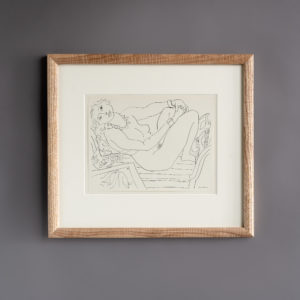
Cahiers D’Art, Dessins de Matisse
£300 eachCahiers D’Art, Dessins de Matisse
Cahiers d'Art is a French artistic and literary journal originally founded in 1926 by Christian Zervos, a Greek philosopher, editor. Born in 1889 in Argostoli on the Greek island of Cephalonia he was brought up in Alexandria, Egypt, finally moving to Paris in 1922. In 1924 Zervos joined the publishing firm Editions Morancé writing art articles for the magazine L'Art d'aujourd '. As an editor, he met many of the artists about whom the magazine wrote: Henri Matisse, Georges Braque, Ferdinand Léger, and Pablo Picasso. He left Morancé in 1926 to found his own journal Cahiers d'art becoming simultaneously publisher, director, model maker, chief editor and main editor. Each issue balanced primitive arts with the modern and contemporary arts and articles by art critics with more literary and poetic texts. According to Zervos, the interest in prehistoric, ancient and extra-European arts was necessary to get a glimpse of contemporary art. It was Zervos who took on the enormous task of documenting all the works of Pablo Picasso into a33-volume catalogue raisonnée, published between 1932 and 1978. One of his deepest wishes was to build up with Cahiers d’Art the visual archives of the artists he considered important. Zervos married Yvonne Marion who ran an art gallery, Galerie du Dragon, next to the location of her husband's shop, the rue Dragon on the left bank of Paris. Madame Zervos became an integral part of her husband's accomplishment and assembling their art collection. Initially published from 1926 to 1960 Cahiers d'Art still exists today after Swedish collector Staffan Ahrenberg purchased the publication and relaunched it in October 2012.£300 each
Featured Items
-
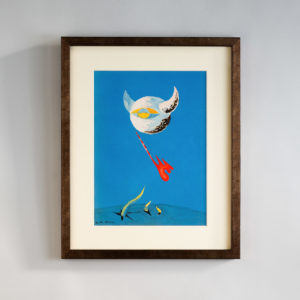
The Moon by André Masson, Verve Vol. 1 / No. 2.
£600The Moon by André Masson, Verve Vol. 1 / No. 2.
The Verve Review was a purposefully luxurious. It ran from 1937 to 1960, but with only 38 editions available, due to the high degree of design and editorial work dedicated to each issue. Each edition contained unique lithographic prints, commissioned by the editor, and each cover a double-page lithograph elaborated by one of the artists contained within. It was the brainchild of its editor Stratis Eleftheriades, a Greek National who moved to Paris in the early thirties to take part in the growing Modernist movement, writing under the name of Teriade.£600 -
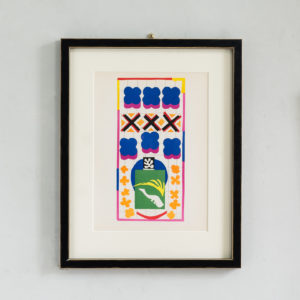
Henri Matisse, ‘The Last Works of Henri Matisse’
£900 eachHenri Matisse, ‘The Last Works of Henri Matisse’
From Verve Vol. IX No. 35/36 published by Tériade under the title 'The Last Works of Henri Matisse'£900 each -
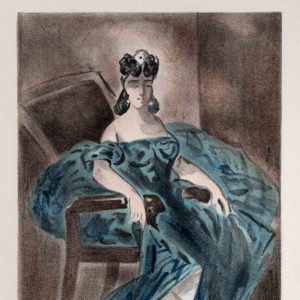
Portraits Part I by Constantin Guys, Verve Vol 2 / No. 5-6.
£500Portraits Part I by Constantin Guys, Verve Vol 2 / No. 5-6.
The Verve Review was a purposefully luxurious. It ran from 1937 to 1960, but with only 38 editions available, due to the high degree of design and editorial work dedicated to each issue. Each edition contained unique lithographic prints, commissioned by the editor, and each cover a double-page lithograph elaborated by one of the artists contained within. It was the brainchild of its editor Stratis Eleftheriades, a Greek National who moved to Paris in the early thirties to take part in the growing Modernist movement, writing under the name of Teriade.£500 -
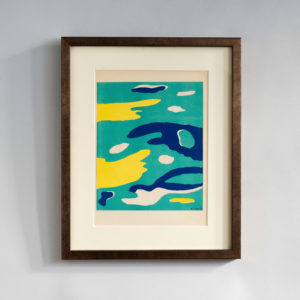
The Four Elements, Water by Fernand Leger, Verve Vol. 1 / No. 1.
£600The Four Elements, Water by Fernand Leger, Verve Vol. 1 / No. 1.
The Verve Review was a purposefully luxurious. It ran from 1937 to 1960, but with only 38 editions available, due to the high degree of design and editorial work dedicated to each issue. Each edition contained unique lithographic prints, commissioned by the editor, and each cover a double-page lithograph elaborated by one of the artists contained within. It was the brainchild of its editor Stratis Eleftheriades, a Greek National who moved to Paris in the early thirties to take part in the growing Modernist movement, writing under the name of Teriade.£600
